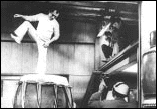|
|
 |
青林舎作品 Production Company : Seirinsha |
| 大阪の郵便局に働く男性のもとに届く脅迫状は名指しで、殺意すら感じる文面で占められていた。被差別部落出身者の彼は、夜一人で地下街を歩くのにも恐怖を感じている。部落差別はいまだにこうした脅迫や「結婚差別」「就職差別」に表われている。長い運動の歴史は住宅の改善をもたらし、この地区にはマンションが建ち並びかつてのような貧困は見えない。しかし、かつて「星」の見える家で眠っていた人は、明るいマンション住まいに寂しさすら感じている。共同体としての部落は薄れている。一方この部落近隣に移り住んだ「水俣」出身者の一家はここで始めて「差別と闘う」ことを知る。夫が部落出身者であったために両親によって戸籍が消された女性の苦境など部落出身者外の問題も多い。ある日屠殺場で働く男性が、自分の娘も通う学校に屠殺場での仕事について話しに出かけた。「誰かが牛を殺さねば牛肉を食べられない」と彼は語る。そして剥がれた牛皮は太鼓となって部落での祭りに鳴り響くのだ。土本作品の助監督、共同演出を務めてきた小池征人の作品。 | A man who works at an Osaka post office received a very threatening letter. The man, a resident of one of Japan's buraku communities, is afraid to walk alone at night. The existence of this kind of threat along with discrimination in employment and marriage make it clear that even today unfair treatment of people from buraku areas persists. However, the long history of the movement has produced results in terms of housing reform, and in the buraku area shown in the film, the kind of poverty that used to exist with row after row of poorly made apartment houses is no longer to be seen. One gets the impression that the people who previously lived in sunless buildings now live in bright new apartments, and at the same time the sense of communality is thinning. Meanwhile, one family that moved to this area from Minamata undertakes the battle against discrimination for the first time. People from outside the buraku area also encounter many problems. For instance, a husband tells of his wife who is not from the buraku and whose parents had her removed from her family registry. One day a man visits the school his daughter attends to tell them what it is like to work at a slaughterhouse. " If someone does not slaughter the cow, we could not eat meat " he tells them. Then we hear the sound of a taiko drum from a festival taking place in a buraku where the hide for the drum heads is produced. The director of this film, Koike Masato, has worked for Tsuchimoto Noriaki as an assistant director. |